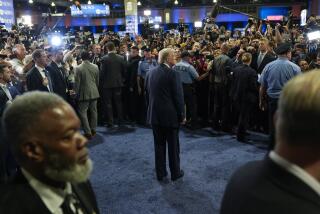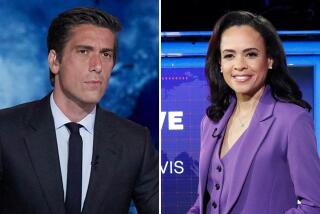Bush’s Campaign Head Rejects Plan for 3 Presidential Debates
WASHINGTON — President Bush’s campaign chairman on Thursday rejected a bipartisan commission’s plan calling for three presidential debates, but said he expected Bush to debate Democrat Bill Clinton before the Nov. 3 election.
“I would expect that there would be debates,” Bush campaign Chairman Robert M. Teeter told reporters, but he said the campaign would not accept the debate proposal in its current form. Clinton accepted the proposal when it was offered last June.
The Bush campaign objects both to the format and the number of debates proposed by the Commission on Presidential Debates, which is headed by former chairmen of both political parties.
White House Chief of Staff James A. Baker III made it clear from the moment he took charge last month that the President was not committed to the panel’s debate plan. Teeter’s comments further distanced the campaign from that proposal, which also includes one vice presidential debate.
“We’re not sure that’s the best way to serve the public,” Teeter said in a session with a group of reporters. “ . . . We will not accept the commission’s proposal as it’s outlined now.”
White House Press Secretary Marlin Fitzwater said Baker had not yet focused on the question of debates. Bush has said over the last two weeks that he has concerns about the format, which calls for the candidates to be questioned by each other rather than by a panel of journalists. Only a moderator would be present.
In the three 1988 debates--two presidential and one vice presidential--a group of journalists questioned the candidates.
Asked whether the Bush campaign opposed the format or the number of the proposed debates, Teeter said: “Both.”
Teeter indicated that the Bush campaign would negotiate. “Our position is that, at some appropriate point, we’ll sit down with the Clinton people and talk about debates,” he said.
But George Stephanopoulos, Clinton’s director of communications, responded: “We don’t need a debate about debates; we need a debate about the future of this country.”
Clinton’s campaign manager, Mickey Kantor, said, “We do not believe that any ‘behind-closed-door’ negotiations between the two campaigns are necessary. To the extent that any details need discussion, we believe that the discussions are properly held under the auspices of the commission.”
The proposed debates would be at Michigan State University in East Lansing on Sept. 22, at the University of San Diego on Oct. 4 and at the University of Richmond, in Virginia, on Oct. 15. The commission also recommended a vice presidential debate in Louisville, Ky., on Sept. 29.
Stephanopoulos said Clinton intends to be at the first scheduled debate on Sept. 22 “and we hope the President overrules his advisers and shows up there too.”
Despite the White House’s objections, Teeter said the Sept. 22 date is not “out the window.”
Historically, debates have better served a challenging candidate, offering an opportunity to be seen on an equal footing with the President.
More to Read
Get the L.A. Times Politics newsletter
Deeply reported insights into legislation, politics and policy from Sacramento, Washington and beyond. In your inbox three times per week.
You may occasionally receive promotional content from the Los Angeles Times.










